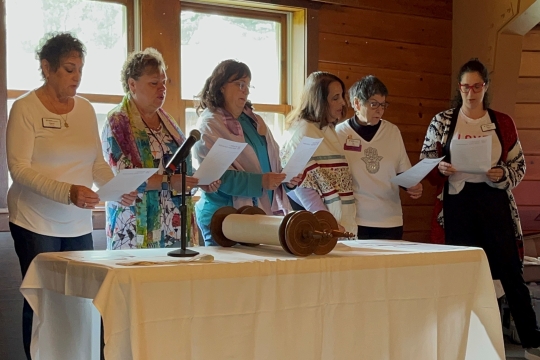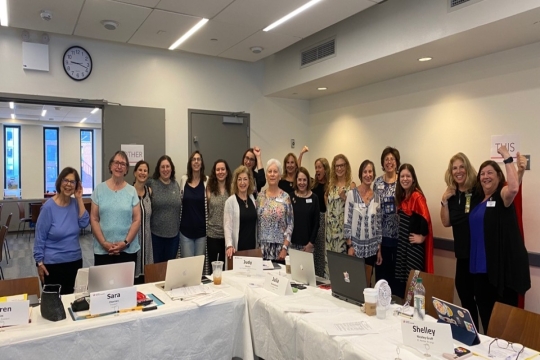
The story of Rebekah can be a great cautionary tale of how not to be a “good Jewish mother.” You know the stereotype: an anxious mother who fawns over her children and then uses guilt to get her children to make the choices she wants them to make.
Like that “good Jewish mother,” Rebekah frets over the well-being of her children. She wants them to grow up to be the people she wants them to be. She mettles with their life’s paths even when they are in their 40’s. She hasn’t learned to let go at all, especially in the case of Jacob.
Rebekah plays favorites. She schemes in this week’s parashah to get Isaac’s blessing for Jacob, bypassing Esau, the first born.
She is heavy-handed in her approach; she is manipulative, and yet, she truly believes she is doing the right thing for her boys.
She has this amazing potential to make her boys resentful of her and to resent the choices they have made. Nowhere does this become more obvious than in the conversations around her sons’ choices in wives.
The Torah tells us: “When Esau was 40 years old, he took to wife Judith daughter of Beeri the Hittite and Basemath daughter of Elon the Hittite. They were a bitterness of spirit to Isaac and Rebekah.” (Genesis 26: 34-35)
When it comes time for Jacob to marry, Rebekah tells Isaac, “I abhor my life because of the daughters of the Hittites; if Jacob takes a wife from the daughters of the Hittites – like these from among the daughters of the land – what would my life be worth?” (Genesis: 27: 46)
Cue the overdramatic Jewish mother.
Yet, Jacob, knowing the bitterness that Esau faced from his parents is given these instructions from his father:
“Do not take a wife from among the daughters of Canaan. Get ready, go to Paddanaram, to the house of Betheuel, your mother’s father, and take yourself a wife among the daughters of Laban your mother’s brother. And may God Almighty bless you, and make you fruitful and numerous, so that you become a host of peoples.” (Genesis: 28; 1-3).
One thing that this portion really illustrates is this: Motherhood doesn’t come with an instruction manual. It doesn’t come with a map that has a clearly marked route to the promise land of nurturing people who become independent, mature and happy.
At every turn in the journey of raising children, you have this thought: Am I doing the right thing?
That thought also follows other thoughts:
Will they be OK? Will I be OK?
Will we survive this? Will this, too, pass?
Will they ever grow up? Followed by: Why are they growing up so fast?
Will they find a career they love? Will they ever truly be able to support themselves?
Will they ever leave the nest? Oh, God, they left the nest!
Will they be happy? Will they find friends and a special someone who will love them for whom they are?
Will I ever not be exhausted? Will I ever sleep well again?
Motherhood is full of moments of needing to bite your tongue, of trusting that these kids will do the right thing, that you have taught them well and they will be OK. Those are the hard times. Those are the times that unlike Rebekah, we take a step back and we let them grow up.
The growing up is hard. It’s a push and pull between allowing them to learn for themselves and doing too much for them.
This year, particularly, I’m reminded of this every day. My son, Ben, is a senior in high school, and my daughter, Ava, is a freshman in high school.
At least once a day, I literally sit on my hands to avoid doing something for them. Usually, it’s picking up their dirty dishes or their dirty socks off the floor. Other times, it’s not giving them the answer to some homework problem, or not trying to offer the fix to the friendship problems they face.
I let go, or at least try to. It’s something Rebekah never learned how to do.
When we say to our girls, “May God make you like Sarah, Rebekah, Rachel and Leah,” let’s remember that they all had some serious faults. They might be the mothers of the Jewish people, but they weren’t always the best mothers.
And sometimes, we’re not always the best mothers. But we sure do try.
Nicole Villalpando is the secretary of Women of Reform Judaism. Professionally, she is a reporter and editor for the Austin American-Statesman, where she writes the parenting column “Raising Austin.”
Related Posts

Parashat Yom Rishon shel Rosh HaShanah

Cultivating a Culture of Accountability and Belonging


